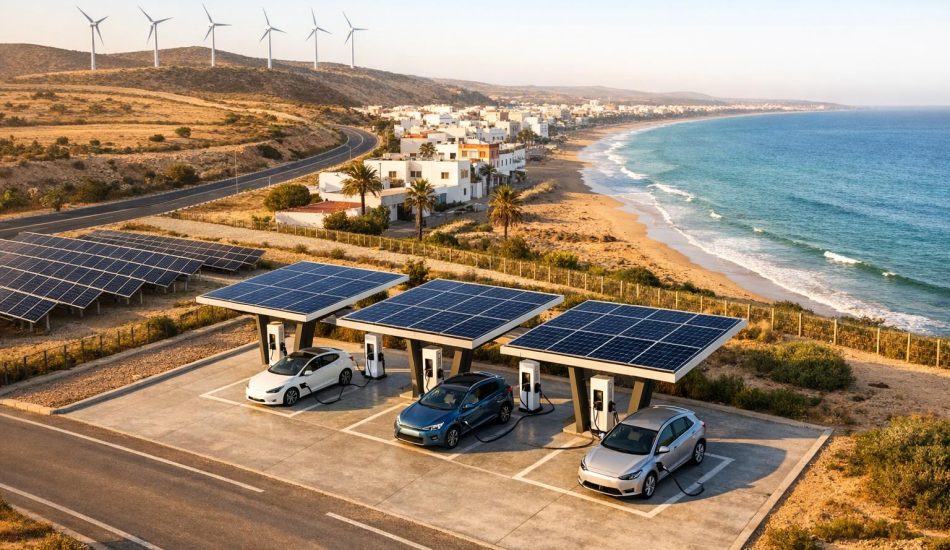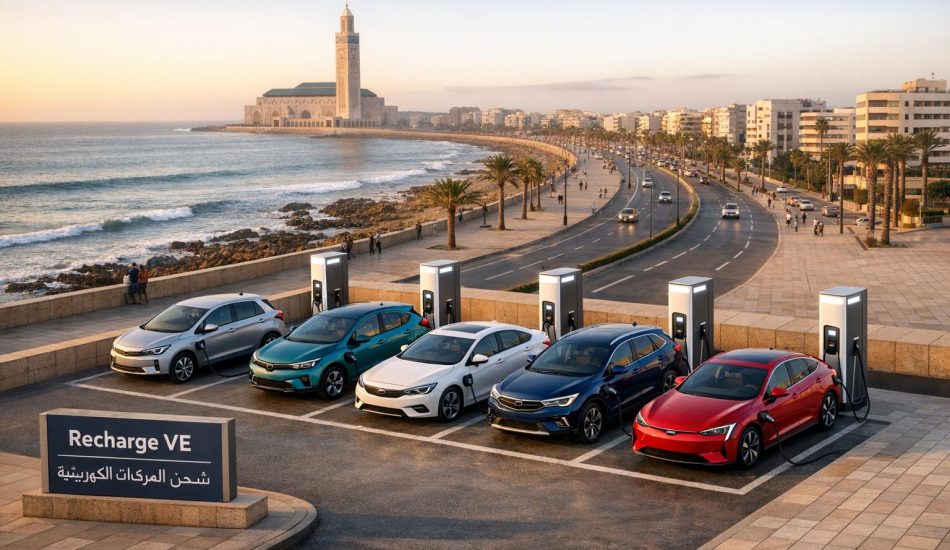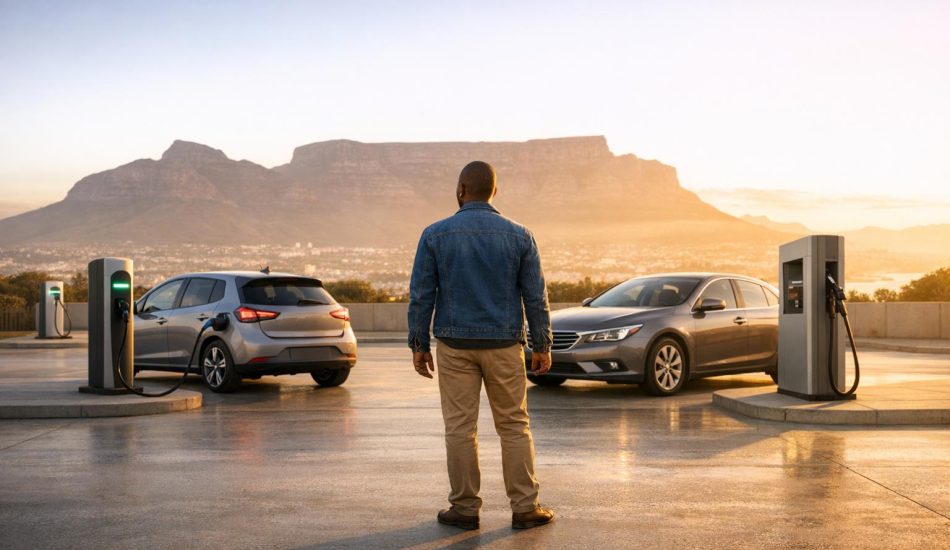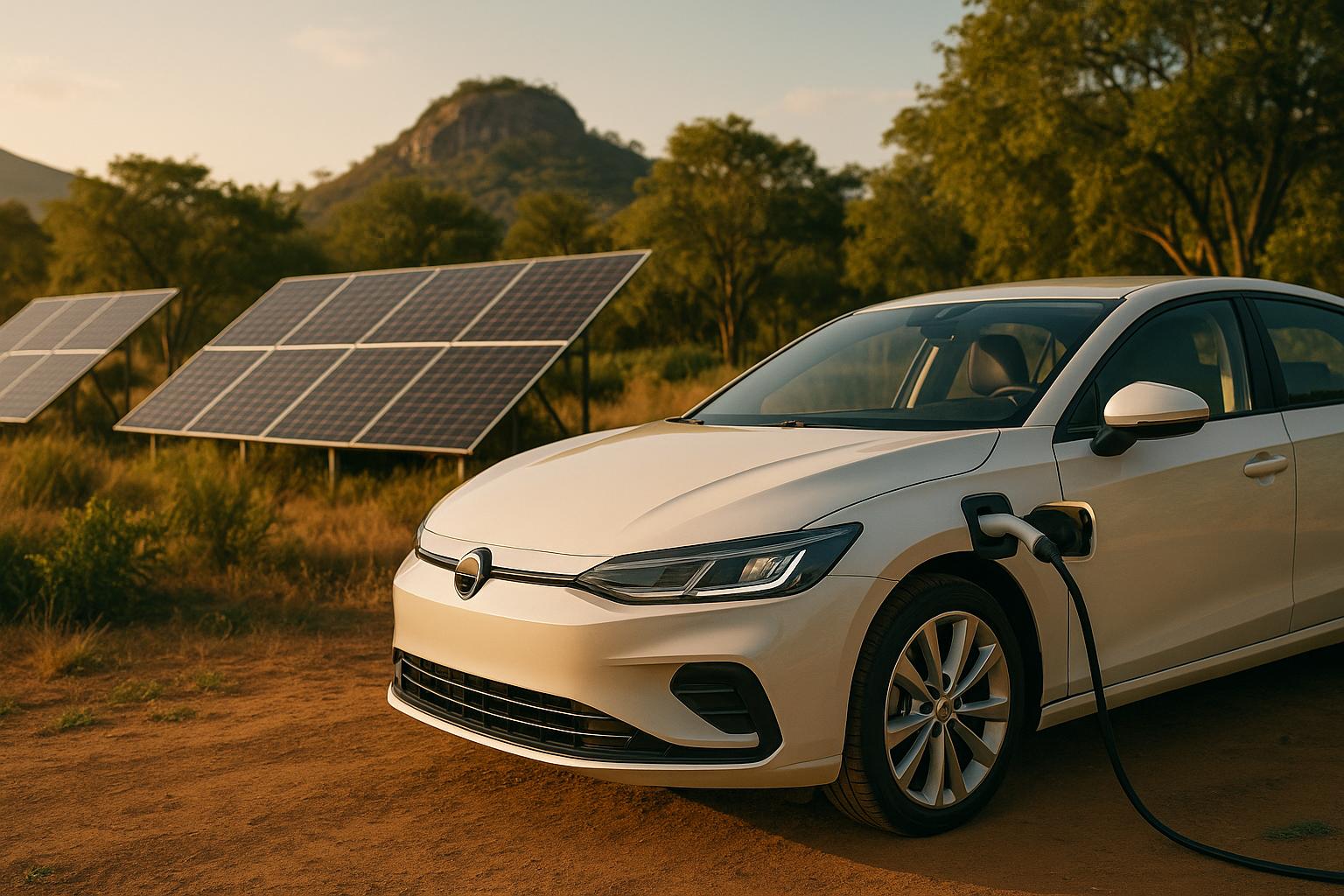
Zimbabwe is stepping into the world of electric cars, balancing challenges and opportunities. While the country faces hurdles like limited charging points, unreliable electricity, and a lack of skilled EV mechanics, it also holds immense potential. With abundant sunshine for solar energy and significant lithium reserves, Zimbabwe could reduce fuel imports, create jobs, and improve air quality. Government incentives, solar-powered charging stations, and partnerships with private companies are already paving the way for growth in the EV market. Key steps include expanding charging infrastructure, lowering import taxes, and educating the public about EV benefits. Despite obstacles, Zimbabwe is positioning itself as a regional leader in electric mobility.
Key Points:
- Challenges: Few charging stations, power outages, and limited EV expertise.
- Opportunities: Solar energy, lithium reserves, and growing government support.
- Current Progress: Pilot solar charging projects, reduced EV import taxes, and local EV assembly plans.
- Future Focus: Building infrastructure, training mechanics, and promoting EV adoption.
Zimbabwe’s journey to electric mobility is just starting, but the potential rewards – economic growth, cleaner air, and energy independence – make it a path worth pursuing.
Why EV Cars Are Hard to Use in Zimbabwe
Many hope that people in Zimbabwe will drive electric cars soon. But big things stand in the way. Most of all, there are not enough places to charge cars and not enough people who know how to fix them.
Not Enough Charging Points
One big problem is that there are not many spots to charge electric cars. Today, only a few towns have public chargers. Some places to charge are in Harare, Mutare, and Bulawayo. These spots are in busy places, like markets or towers. But even in the city, there is not much power. Many lose power for long hours, sometimes as long as one whole day. This makes it hard to use cars that run on power for most long trips. Some far away towns and small villages do not have much power at all. So, it is almost not possible to use electric cars outside of big towns, and people with these cars mostly live in the city.
Not Enough Help or Clear Rules
Not having help from rules or people who know how electric cars work is also a problem. There are few laws that make it simple to buy or use these cars. Not many people have the skill or know-how to fix and care for electric cars. Many shops fix cars that use gas, but do not work on electric ones. There are not many places to learn how to fix or care for these new cars. Because people do not know where to go for help, some worry if they will be stuck with a car that needs work or parts. This makes people unsure if buying an electric car is good. So, most people stay with the gas ones for now.
In short, not having enough chargers, rules, and help stops people in Zimbabwe from using and buying more electric cars. Change will need easy ways to charge cars, more people who know how to fix them, and more rules that make switching to these cars less hard.
Benefits of Electric Cars for Zimbabwe
Electric cars can help Zimbabwe move ahead in many ways. Most of all, these cars can save money, help keep air clean, and give people more jobs. There are problems, but the good things are big and hard to overlook.
Less Need for Fuel and Lower Import Spending
Zimbabwe uses a lot of its money to buy fuel from other places. This money could help buy food, pay for health care, or build roads and homes. If more people drive electric cars, the country will not need as much fuel from outside. Money will stay in Zimbabwe and help its people. Electric cars use power that can be made in Zimbabwe. The sun shines often here, so solar power is a smart plan. Some groups, like NSSA and Old Mutual, have put money into a new solar plant near Harare. Now, this solar plant gives clean power to homes and helps more people start using electric cars.
"As demand grows for electric vehicles, local assembly of these EVs could then be explored, creating further opportunities to use local components and cutting down on that large import bill."
This change in how we use money is not only to save cash. It is also to keep the world clean.
Good Things for Our World
Cars that use power do not send dirty air out of their pipes. This means that the air in big towns like Harare and Bulawayo can be much better to breathe. When air is clean, people get sick less, and kids and old folks are safer. If these cars use sun or wind power, they help stop bad changes in the weather too. If we have clean air, our wild places like Victoria Falls and big parks will stay nice. These spots are good for both guests and for people who live by selling things to them.
Money Gains
Zimbabwe has lots of lithium. This gives the country a strong spot in sales of cars that run on power. Lithium helps make the batteries for these cars. If Zimbabwe uses this, it can be a big player when people all over the world buy or sell these cars and parts.
"Zimbabwe holds significant lithium reserves, a critical input in EV battery technology. This could position the country as a player in the emerging EV market, both regionally and globally."
- Lungelo Ndhlovu
Here is your rewritten text, using short simple words and common words, with varied sentence lengths, keeping at least the same word count:
But there is more to gain than just selling raw things. If people put money into making batteries and cars inside the country, Zimbabwe could grow much more. This would help many find jobs. People would be needed for making things, building cars, fixing and taking care of them. Many kinds of jobs could open up. Experts say, “On top of that, making electric cars and all the work around it can help create new jobs and help the economy in SSA. Work in making, building, and fixing cars will need people with skill and some tech know-how, which can give jobs to those who live in SSA.”
Work on this has started. In 2025, the government of Zimbabwe joined up with groups like Agilitee to set up a place to build cars. At the same time, gas stores are putting in places to charge electric cars, right where they serve people. This area, Sub-Saharan Africa, has a lot – over four out of ten parts – of the earth’s cobalt, manganese, and platinum brands. If people work together in this area, they could build big places to make things and set up strong groups for batteries.
Word count: 204
Original count: 197
sbb-itb-99e19e3
Ways to Beat Big Problems
Zimbabwe can fix its problems with electric cars by using smart plans that help build a better future. These ideas help deal with the tough issues that were talked about before, and show steps that can work.
Making Solar Car Charging Spots
Zimbabwe gets lots of sun. So, using sun power is a good way to fix the charging problem. If Zimbabwe puts up car chargers that use the sun, people can charge cars even when the lights go out. Sun power is clean and safe. Big cities like Harare, Bulawayo, and Mutare could have sun chargers at gas stations. In small towns, where power is hard to get, sun charging spots could help more people use electric cars. If the government works with private companies, and gives them help and rewards, then more sun chargers can be built, and faster too.
Working Together and Giving Help
For things to get better, the government and businesses have to work as one. Zimbabwe has started to make electric cars cheaper for people. In January 2025, the cost to bring in electric cars from other places went down from 40% to 25%. The new car plan also wants to make tax on electric cars lower, from 14.5% to 4.5%, for a few years. There are plans for money help too – the budget is $366.7 million to help people get electric cars until 2030. All these steps make cars cost less and make people feel safe when buying one. This means worries about money are less.
Helping People Learn More
Teaching people about electric cars is key. The car plan says to help people know more about these cars. Ads and lessons can show how much money you save in a few years, since you spend less on gas and fixing the car. People should get to try the cars in person at events, so they can see charging is easy – you just plug it in at home at night. Sites like EV24.africa show which cars are out there, how much they cost, and let people read honest reviews. These learning tools, along with new places to charge and better rules, help more people want to buy these cars. Good stories and tips told on TV, radio, papers, and online can make having an electric car feel simple and fun.
Case Studies and Success Stories
Zimbabwe is demonstrating that electric vehicles (EVs) can thrive even in challenging environments. These projects highlight how EVs are gradually becoming a key part of the country’s transportation landscape.
Local EV Success Examples
BYD Zimbabwe has been leading efforts to promote EV adoption by importing and marketing electric cars and motorcycles. This growing demand is a promising sign for the country’s EV market. A noteworthy step came from the government’s Central Mechanical Equipment Department (CMED), which added 14 electric vehicles to its fleet. These vehicles are being used in driving schools and as shuttle services at airports. Such practical applications not only showcase the technology’s potential but also help build public confidence in its reliability.
Since these efforts began, interest in EVs has grown. By 2022, Zimbabwe had 30 registered electric vehicles and 1,000 hybrid vehicles. While these numbers are still small, they signal a shift in transportation trends. Pilot projects are now pushing boundaries further by exploring innovative charging solutions.
Pilot Programs in Action
In 2023, Zimbabwe initiated pilot projects to test solar-powered EV charging stations. These stations, developed through partnerships between the government and private companies, were set up in major cities like Harare, Bulawayo, and Mutare.
The results have been encouraging. Peak utilization rates at these pilot stations exceeded 70%, and user feedback has been overwhelmingly positive. Charging locations include prominent sites such as the Fidelity Life Centre, Century Towers, and the ZITF grounds.
To further support the initiative, the government introduced equipment rebates for approved operators starting January 1, 2025. These rebates help reduce the financial barriers to setting up off-grid, renewable energy charging stations – a practical solution for a country with abundant sunshine but an inconsistent electricity supply.
How EV24.africa Drives Adoption
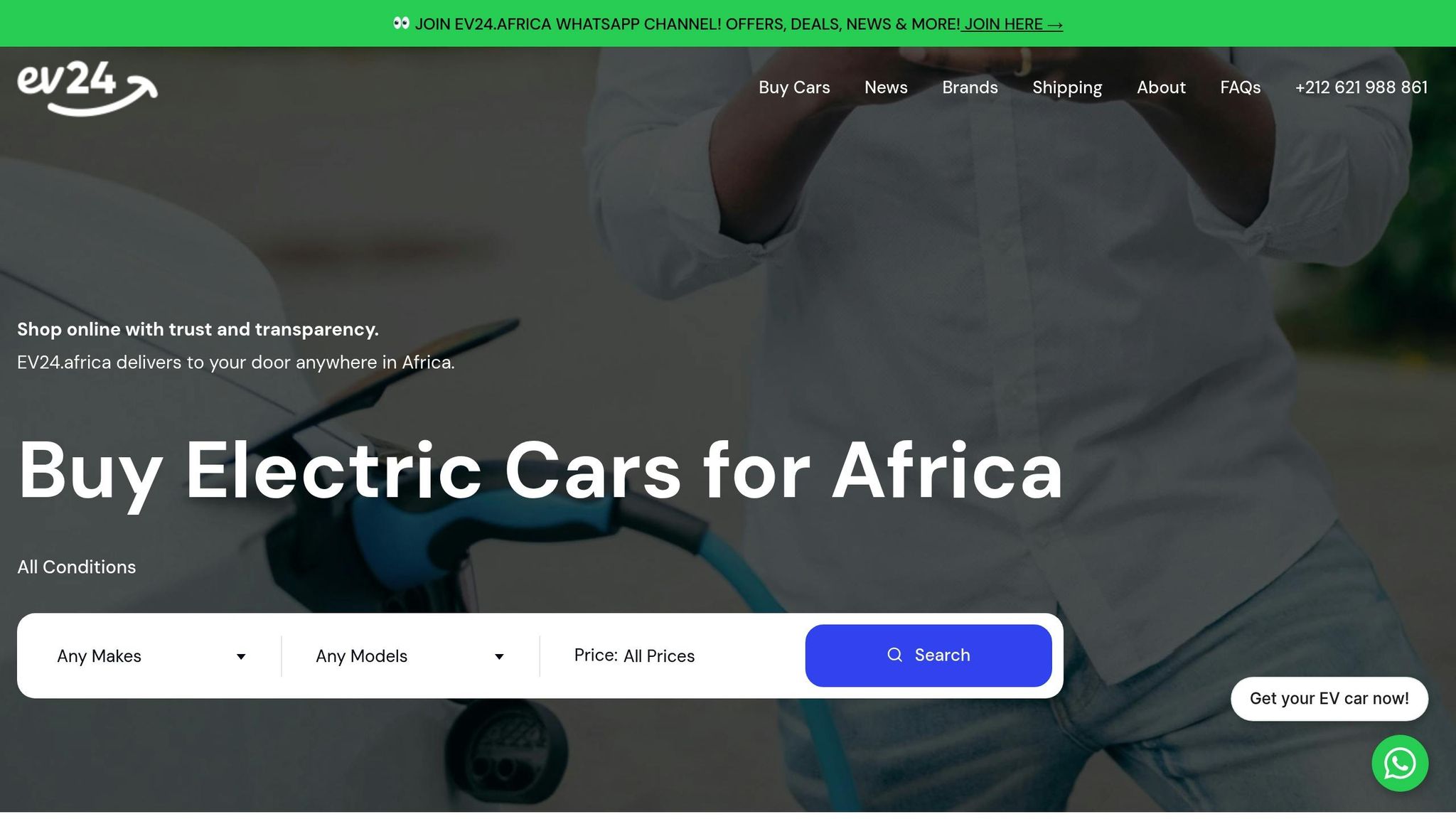
While local projects pave the way, EV24.africa is playing a crucial role in expanding the EV market. The platform simplifies the buying process, offering a one-stop shop for EV listings from top brands like Tesla, BYD, Leapmotor, and Hyundai. Buyers can easily compare options, access financing solutions to tackle high upfront costs, and review detailed vehicle specifications and customer feedback.
EV24.africa also ensures accessibility by delivering vehicles to all 54 African countries, making EVs available even in smaller cities. To top it off, the platform offers expert car service support, giving buyers peace of mind when it comes to maintenance. Together, these services are helping to make EV adoption easier and more accessible across the continent.
Conclusion and Future Outlook
Key Findings Summary
Zimbabwe’s journey toward embracing electric vehicles (EVs) is filled with hurdles but holds immense promise. The country grapples with high investment costs, limited charging infrastructure, and gaps in policy support. However, the potential rewards are substantial – reducing reliance on fuel imports, advancing renewable energy use, and creating economic opportunities that could reshape the transportation landscape.
Pilot projects using solar-powered charging stations highlight the viability of renewable energy solutions for Zimbabwe’s EV challenges. While still in the early stages, both public and private initiatives are steadily laying the groundwork for wider EV adoption. Overcoming these obstacles is essential to unlocking the full potential of electric mobility in Zimbabwe.
Recommendations for Stakeholders
From the findings, several actionable steps emerge for key players in Zimbabwe’s EV ecosystem:
- Government agencies should focus on expanding the charging infrastructure, with an emphasis on renewable energy solutions. Clear policies on EV import duties and financing options are critical to making EVs more accessible.
- Private businesses have a vital role in partnering with government initiatives to strengthen the charging network. Companies could also explore electrifying their fleets, such as urban delivery vehicles or corporate shuttles, especially in areas with reliable charging facilities.
- Consumers can make use of resources like EV24.africa to explore financing options and compare EV models, addressing concerns about affordability and access to after-sales support.
Zimbabwe’s EV Future Vision
With the right steps, Zimbabwe has the potential to emerge as a leader in sustainable transportation within the region. The country’s abundant solar energy resources provide a unique advantage, enabling the development of clean and efficient charging networks that reduce strain on traditional power grids. This could attract international investments and foster partnerships in advanced technology.
If infrastructure development continues alongside supportive policies, Zimbabwe could see significant growth in EV adoption. Renewable energy-powered charging solutions may even serve as a blueprint for other nations in the region.
Beyond transportation, a thriving EV ecosystem could spur economic growth. Expanding charging networks, establishing EV maintenance services, and boosting renewable energy sectors could create jobs and support broader goals like energy independence and environmental stewardship.
Ultimately, Zimbabwe’s success in this space will rely on a united effort – where forward-thinking government policies, private sector innovation, and international collaboration come together to address challenges and build a resilient and sustainable EV future.
FAQs
How is Zimbabwe addressing the lack of charging stations for electric vehicles?
Zimbabwe is working to boost its electric vehicle (EV) charging network by cutting import duties on EVs and providing duty rebates for solar-powered charging equipment. These initiatives are designed to make EVs more affordable and attract investments in renewable energy options.
By prioritizing solar-powered charging stations, Zimbabwe is tapping into its plentiful sunlight to develop an energy-efficient and budget-friendly approach to EV infrastructure. This strategy not only reduces dependence on conventional fuels but also strengthens the country’s energy self-sufficiency.
How could Zimbabwe’s lithium reserves shape its role in the global electric vehicle market?
Zimbabwe holds immense potential in the global electric vehicle (EV) market, thanks to its substantial lithium reserves. Lithium, a key ingredient in EV batteries, is in high demand as the world shifts toward cleaner energy solutions. This positions Zimbabwe as a country that could reap significant economic rewards.
To seize this opportunity, the government has implemented policies to prohibit the export of raw lithium. Additionally, there are plans to stop exporting lithium concentrate by 2027. These steps are designed to promote local refining, attract international investments, and generate employment opportunities. By taking these measures, Zimbabwe aims to solidify its role in the EV supply chain and drive economic growth in a sustainable manner.
How do government incentives and private sector partnerships support the adoption of electric vehicles in Zimbabwe?
Government incentives are a driving force behind the push for electric vehicle (EV) adoption in Zimbabwe. Starting January 1, 2025, import duties on EVs will drop from 40% to 25%. Additionally, tax rebates are available for equipment used in solar-powered EV charging. These steps are designed to make EVs more affordable while encouraging the use of renewable energy for charging.
The private sector also plays a crucial role in this transition. The government is teaming up with businesses to build essential infrastructure, such as charging stations. These collaborations aim to tackle logistical challenges and create a more sustainable and accessible electric mobility network throughout the country.


